Perdana Global Peace Organization
International Conference on Gaza: Breaking the Siege
In the Spirit of Rachel Corrie and Mavi Marmara
11, July 2010, Putra World Trade Centre, Kuala Lumpur, Malaysia
We are dealing with a carefully planned military operation.
The Israeli Navy Commando which attacked the Marvi Marmara on May 31st had prior knowledge of who was on the Turkish ship including where passengers were residing in terms of cabin layout. According to Swedish author Henning Mankell, who was on board the Marmara , "the Israeli forces attacked sleeping civilians."
These were targeted assassinations. Specific individuals were targeted. Journalists were targeted with a view to confiscating their audio and video recording equipment and tapes.
"We were witnesses to premeditated murders," said historian Mattias Gardell who was on the Mavi Marmara.
"...Asked about why activists on the Turkish ship had attacked the Israeli soldiers, Gardell stressed "it is not as if Israel is a police officer whom no human being has the legitimate right to defend him or herself against":
"If you are attacked by commando troops you of course must have the right to defend yourself ... Many people on this ship thought they were going to kill everyone. They were very frightened ... It's strange if people think one should not defend oneself. Should you just sit there and say: 'Kill me'?" he said." (See Mahdi Darius Nazemroaya, Detailed Compiled Eyewitness Accounts Confirm Cold-Blooded Murder and Executions by Israeli Military, Global Research, June 1, 2010)
“They even shot those who surrendered. Many of our friends saw this. They told me that there were handcuffed people who were shot,” (quoted by Press TV)
The Israeli Commando had an explicit order to kill.
What was the role of the United States?
The raids on the Gaza Freedom Flotilla, bear the mark of previous Israeli operations directed against unarmed civilians. It is a well established modus operandi of Israeli military-intelligence operations, which is tacitly supported by the US administration.
The killing of civilians is intended to trigger a response by Palestinian resistance forces, which in turn justifies Israeli retaliation (on "humanitarian" grounds) as well as a process of military escalation. The logic of this process contained in Ariel Sharon`s "Operation Justified Vengeance" (also referred to as the "Dagan Plan" named after Sharon's National Security advisor) was initiated at the outset the Sharon government in 2001. This Operation was intent upon destroying the Palestinian Authority and transforming Gaza into an urban prison. (See Michel Chossudovsky, "Operation Justified Vengeance": Israeli Strike on Freedom Flotilla to Gaza is Part of a Broader Military Agenda, Global Research, June 1, 2010).
"Operation Cast Lead" resulting in the December 2008 invasion of Gaza should be understood as part of the logic of "Operation Justified Vengeance". In turn, the Israeli attack on the Flotilla must be viewed as a continuation of "Operation Cast Lead" which seeks to enforce the Siege on Gaza.
The attack on the Flotilla bears the fingerprints of a military intelligence operation coordinated by the IDF and Mossad, which is now headed by one of the main architects of "Operation Justified Vengeance", Meir Dagan. It is worth recalling that as a young Coronel, Dagan worked closely with then defense minister Ariel Sharon in the raids on the Palestinian settlements of Sabra and Shatilla in Beirut in 1982.
The Role of the United States
There are indications that the US was consulted at the highest levels regarding the nature of the military operation directed against the flotilla. Moreover, in the wake of the attacks, both the US and the UK unequivocally reaffirmed their support to Israel.
There are longstanding and ongoing military and intelligence relations between the US and Israel including close working ties between various agencies of government: Pentagon, National Intelligence Council, State Department, Homeland Security and their respective Israeli counterparts.
These various agencies of government are involved in routine liaison and consultations, usually directly as well as through the US Embassy in Israel, involving frequent shuttles of officials between Washington and Tel Aviv as well as exchange of personnel. Moreover, the US as well as Canada have public security cooperation agreements with Israel pertaining to the policing of international borders, including maritime borders. (See Israel-USA Homeland Security Cooperation, See also Michel Chossudovsky, The Canada-Israel "Public Security" Agreement, Global Research, 2 April 2008)
Several high level US-Israel meetings were held in the months prior to the May 31st attacks.
Rahm Emmanuel, Obama's White House chief of Staff was in Tel Aviv a week prior to the attacks. Confirmed by press reports, he had meetings behind closed doors with Prime Minister Netanyahu (May 26) as well as a private visit with President Shimon Peres on May 27.
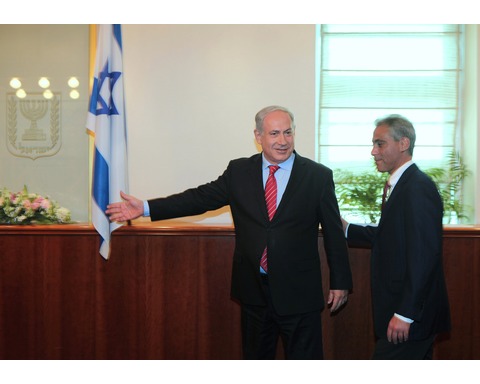
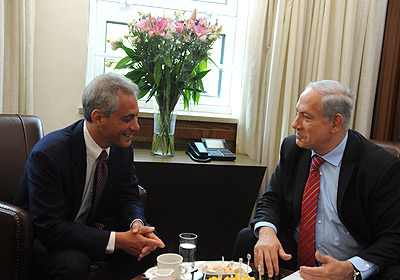
May 26 meeting between Rahm Emmanuel and Prime Minister Binyamin Netanyahu
Official statements do not indicate whether other officials including cabinet ministers or IDF and Mossad officials were present at the Rahm Emmanuel-Netanyahu meeting. The Israeli press confirmed that Rahm Emmanuel had a meeting with Defense Minister Ehud Barak, whose Ministry was responsible for overseeing the Commando attack on the Flotilla. (Rahm Emanuel visits Israel to celebrate son's bar mitzvah - Haaretz Daily Newspaper | Israel News, 23 May 2010). The White House also confirmed that Rahm Emmanuel was to meet other high-ranking Israeli officials, without providing further details. (Rahm Emanuel in Israel for Son's Bar Mitzvah, May Meet With Officials)
"Our Man in the White House"
While born in the US, Rahm Emmanuel also holds Israeli citizenship and has served in the Israeli military during the First Gulf War (1991).
Rahm is also known for his connections to the pro-Israeli lobby in the US. The Israeli newspaper Maariv calls him "Our Man in the White House" (quoted in Irish Times, March 13, 2010). Rahm Emmanuel gave his support to Obama in the November 2008 presidential elections following Obama`s address to the pro-Israeli lobby AIPAC.
At the time of Rahm Emmanuel's confirmation as White House chief of staff, there were reports in the Middle East media of Rahm Emanuel's connections to Israeli intelligence.
The exact nature of Rahm Emmanuel's ties to the Israeli military and intelligence apparatus, however, is not the main issue. What we are dealing with is a broad process of bilateral coordination and decision-making between the two governments in the areas of foreign policy, intelligence and military planning, which has been ongoing for more than 50 years. In this regard, Israel, although exercising a certain degree of autonomy in military and strategic decisions, will not act unilaterally, without receiving the "green light" from Washington. Rahm Emmanuel`s meetings with the prime minister and Israeli officials are part of this ongoing process.
Rahm Emmanuel's meetings in Tel Aviv on May 26 were a routine follow-up to visits to Washington by Prime Minister Netanyahu in March and by Minister of Defense Ehud Barak in late April. In these various bilateral US-Israel encounters at the White House, the state Department and the Pentagon, Rahm Emmanuel invariably plays a key role.
While the pro-Israeli lobby in the US influences party politics in America, Washington also influences the direction of Israeli politics. There have been reports to the effect that Rahm Emmanuel would "lead a team of high octane Democratic party pro-Israel political operatives to run the campaign for the Defense Minister Ehud Barak" against Netanyahu in the next Israeli election. (Ira Glunts, Could Rahm Emanuel Help Barak Unseat Netanyahu? Palestine Chronicle, June 2, 2010)
Israel's Defense Minister Ehud Barack in Washington
The April 27 meeting between US Defense Secretary Robert Gates and Defense Minister Ehud Barak pertained to "a range of important defense issues" directly or indirectly related to the status of the Palestinian territories under Israeli occupation:
"As President Obama has affirmed, the United States commitment to Israel's security is unshakable, and our defense relationship is stronger than ever, to the mutual benefit of both nations. The United States and our ally Israel share many of the same security challenges, from combating terrorism to confronting the threat posed by Iran's nuclear-weapons program.
For years, the United States and Israel have worked together to prepare our armed forces to meet these and other challenges, a recent major example being the Juniper Cobra joint exercise held last October. Our work together on missile-defense technology is ongoing, and the United States will continue to ensure that Israel maintains its qualitative military edge." (Press Conference with Secretary Gates and Israeli Defense Minister Barak, April 2010 - Council on Foreign Relations April 27, 2010)
These consultations pertained to ongoing military preparations regarding Iran. Both Israel and the US have recently announced that a pre-emptive attack against Iran has been contemplated.
Washington views Israel as being "'integrated into America’s military architecture,' especially in the missile defense sphere." (quoted in Emanuel to rabbis: US 'screwed up' Jerusalem Post, statement of Dennis Ross, who is in charge of the US administration’s Iran policy in the White House, May 16, 2010).
Targeting Iran
The attack on the Freedom Flotilla, might appear as a separate and distinct humanitarian issue, unrelated to US-Israeli war plans. But from the standpoint of both Tel Aviv and Washington, it was part of the broader military agenda. It was intended to create conditions favoring an atmosphere of confrontation and escalation in the Middle East war theater;
"All the signs are that Israel has been stepping up its provocations to engineer a casus belli for a war against Hamas in Gaza and Hezbollah in Lebanon. Tel Aviv sees as unfinished business its inconclusive wars: the first in Lebanon in 2006, and the second in Gaza in 2008-09." (Jean Shaoul Washington Comes to the Aid of Israel over Gaza Convoy Massacre, Global Research, June 4, 2010)
Following Israel's illegal assault in international waters, Netanyahu stated emphatically "Israel will continue to exercise its right to self defence. We will not allow the establishment of an Iranian port in Gaza," suggesting that the Gaza blockade was part of the pre-emptive war agenda directed against Iran, Syria and Lebanon. (Israeli forces board Gaza aid ship the Rachel Corrie - Telegraph, June 5, 2010, emphasis added) .
Moreover, the raid on the Flotilla coincided with NATO-Israel war games directed against Iran. According to the Sunday Times, "three German-built Israeli submarines equipped with nuclear cruise missiles are to be deployed in the Gulf near the Iranian coastline." (Israel Deploys Three Nuclear Cruise Missile-Armed Subs Along Iranian Coastline).
While Israeli naval deployments were underway in the Persian Gulf, Israel was also involved in war games in the Mediterranean. The war game codenamed "MINOAS 2010" was carried out at a Greek air base in Souda Bay, on the island of Crete. Earlier in February, The Israeli air force "practiced simulated strikes at Iran's nuclear facilities using airspace of two Arab countries in the Persian Gulf, which are close territorially with the Islamic republic and cooperate with Israel on this issue." Ria Novosti,War Games: Israel gets ready to Strike at Iran's Nuclear Sites,, March 29, 2010)
Also, in the wake of the final resolution of the 2010 Review Conference of the Parties to the Treaty on the Non-Proliferation directed against Israel's nuclear weapons program, the White House has reaffirmed its endorsement of Israel's nuclear weapons capabilities. Washington's statement issued one day before the raid on the flotilla points to unbending US support to "Israel's strategic and deterrence capabilities", which also include the launching of a pre-emptive nuclear attack on Iran:
"a senior political source in Jerusalem said Sunday that Israel received guarantees from U.S. President Barack Obama that the U.S. would maintain and improve Israel's strategic and deterrence capabilities.
According to the source, "Obama gave [Prime Minister Benjamin] Netanyahu unequivocal guarantees that include a substantial upgrade in Israel-U.S. relations."
Obama promised that no decision taken during the recent 189-nation conference to review and strengthen the 40-year-old Nuclear Non-proliferation Treaty "would be allowed to harm Israel's vital interests," the sources said. Obama promised to bolster Israel's strategic capabilities, Jerusalem officials say - Haaretz Daily Newspaper)
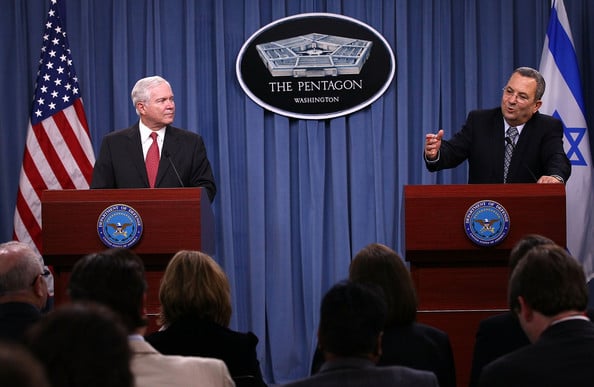
Robert Gates and Israel's Minister of Defense Ehud Barak, Press Conference, April 27, 2010
The Turkey-Israel Relationship in Jeopardy?
The actions of Israel against the Freedom Flotilla have important ramifications. Israel's criminal actions in international waters have contributed to weakening the US-NATO-Israel military alliance.
The bilateral Israel-Turkey alliance in military, intelligence, joint military production is potentially in jeopardy. Ankara has already announced that three planned military exercises with Israel have been cancelled. "The government announced it was considering reducing its relations with Israel to a minimum."
It should be understood that Israel and Turkey are partners and major actors in the US-NATO planned aerial attacks on Iran, which have been in the pipeline since mid-2005. The rift between Turkey and Israel has a direct bearing on NATO as a military alliance. Turkey is one of the more powerful NATO member states with regard to its conventional forces. The rift with Israel breaks a consensus within the Atlantic Alliance. It also undermines ongoing US-NATO-Israel pre-emptive war plans directed against Iran, which until recently were endorsed by the Turkish military.
From the outset in 1992, the Israeli-Turkish military alliance was directed against Syria, as well as Iran and Iraq. (For details see See Michel Chossudovsky, "Triple Alliance": The US, Turkey, Israel and the War on Lebanon, Global Research, 2006)
In 1997, Israel and Turkey launched "A Strategic Dialogue" involving a bi-annual process of high level military consultations by the respective deputy chiefs of staff. (Milliyet, Istanbul, in Turkish 14 July 2006).
During the Clinton Administration, a triangular military alliance between the US, Israel and Turkey had unfolded. This "triple alliance", which in practice is dominated by the US Joint Chiefs of Staff, integrates and coordinates military command decisions between the three countries pertaining to the broader Middle East. It is based on the close military ties respectively of Israel and Turkey with the US, coupled with a strong bilateral military relationship between Tel Aviv and Ankara.
Starting in 2005, Israel has become a de facto member of NATO. The triple alliance was coupled with a 2005 NATO-Israeli military cooperation agreement which included "many areas of common interest, such as the fight against terrorism and joint military exercises. These military cooperation ties with NATO are viewed by the Israeli military as a means to "enhance Israel's deterrence capability regarding potential enemies threatening it, mainly Iran and Syria." ("Triple Alliance": The US, Turkey, Israel and the War on Lebanon).
The Issue of Territorial Waters: Gaza's Offshore Gas Fields
Israel's blockade of Gaza is in large part motivated by the broader issue of control of Gaza's territorial waters, which contain significant reserves of natural gas.
What is at stake is the confiscation of Palestinian gas fields and the unilateral de facto declaration of Israeli sovereignty over Gaza's maritime areas. If the blockade were to be broken, Israel's de facto control over Gaza's offshore gas reserves would be jeopardy. (See Michel Chossudovsky,War and Natural Gas: The Israeli Invasion and Gaza's Offshore Gas Fields, Global Research, January 8, 2009. See also Michel Chossudovsky, The War on Lebanon and the Battle for Oil, Global Research, July 23, 2006)
British Gas (BG Group) and its partner, the Athens based Consolidated Contractors International Company (CCC) owned by Lebanon's Sabbagh and Koury families, were granted oil and gas exploration rights in a 25 year agreement signed in November 1999 with the Palestinian Authority.
The rights to the offshore gas field are respectively British Gas (60 percent); Consolidated Contractors (CCC) (30 percent); and the Investment Fund of the Palestinian Authority (10 percent). (Haaretz, October 21, 2007).
The PA-BG-CCC agreement includes field development and the construction of a gas pipeline.(Middle East Economic Digest, Jan 5, 2001).
The BG licence covers the entire Gazan offshore marine area, which is contiguous to several Israeli offshore gas facilities. (See Map below). It should be noted that 60 percent of the gas reserves along the Gaza-Israel coastline belong to Palestine.
The BG Group drilled two wells in 2000: Gaza Marine-1 and Gaza Marine-2. Reserves are estimated by British Gas to be of the order of 1.4 trillion cubic feet, valued at approximately 4 billion dollars. These are the figures made public by British Gas. The size of Palestine's gas reserves could be much larger.
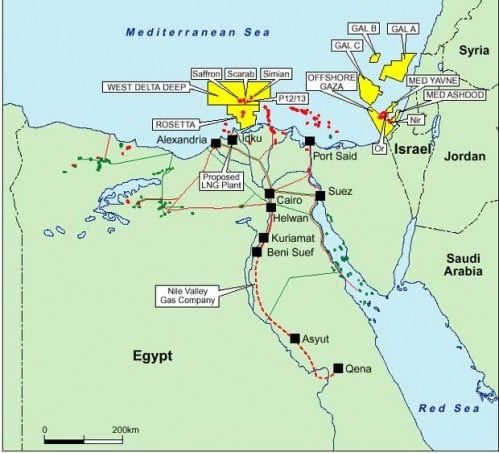
Map 1
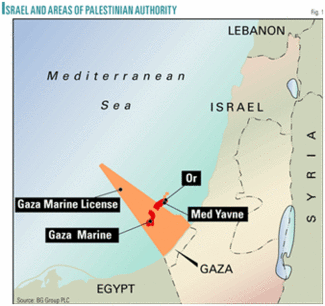
Map 2
Who Owns the Gas Fields
The issue of sovereignty over Gaza's gas fields is crucial. From a legal standpoint, the gas reserves belong to Palestine.
The death of Yasser Arafat, the election of the Hamas government and the ruin of the Palestinian Authority have enabled Israel to establish de facto control over Gaza's offshore gas reserves.
British Gas (BG Group) has been dealing with the Tel Aviv government. In turn, the Hamas government has been bypassed in regards to exploration and development rights over the gas fields.
The election of Prime Minister Ariel Sharon in 2001 was a major turning point. Palestine's sovereignty over the offshore gas fields was challenged in the Israeli Supreme Court. Sharon stated unequivocally that "Israel would never buy gas from Palestine" intimating that Gaza's offshore gas reserves belong to Israel.
In 2003, Ariel Sharon, vetoed an initial deal, which would allow British Gas to supply Israel with natural gas from Gaza's offshore wells. (The Independent, August 19, 2003)
The election victory of Hamas in 2006 was conducive to the demise of the Palestinian Authority, which became confined to the West Bank, under the proxy regime of Mahmoud Abbas.
In 2006, British Gas "was close to signing a deal to pump the gas to Egypt." (Times, May, 23, 2007). According to reports, British Prime Minister Tony Blair intervened on behalf of Israel with a view to shunting the agreement with Egypt.
The following year, in May 2007, the Israeli Cabinet approved a proposal by Prime Minister Ehud Olmert "to buy gas from the Palestinian Authority." The proposed contract was for $4 billion, with profits of the order of $2 billion of which one billion was to go the Palestinians.
Tel Aviv, however, had no intention on sharing the revenues with Palestine. An Israeli team of negotiators was set up by the Israeli Cabinet to thrash out a deal with the BG Group, bypassing both the Hamas government and the Palestinian Authority:
"Israeli defence authorities want the Palestinians to be paid in goods and services and insist that no money go to the Hamas-controlled Government." (Ibid, emphasis added)
The objective was essentially to nullify the contract signed in 1999 between the BG Group and the Palestinian Authority under Yasser Arafat.
Under the proposed 2007 agreement with BG, Palestinian gas from Gaza's offshore wells was to be channeled by an undersea pipeline to the Israeli seaport of Ashkelon, thereby transferring control over the sale of the natural gas to Israel.
The deal fell through. The negotiations were suspended:
"Mossad Chief Meir Dagan opposed the transaction on security grounds, that the proceeds would fund terror". (Member of Knesset Gilad Erdan, Address to the Knesset on "The Intention of Deputy Prime Minister Ehud Olmert to Purchase Gas from the Palestinians When Payment Will Serve Hamas," March 1, 2006, quoted in Lt. Gen. (ret.) Moshe Yaalon, Does the Prospective Purchase of British Gas from Gaza's Coastal Waters Threaten Israel's National Security? Jerusalem Center for Public Affairs, October 2007)
Israel's intent was to foreclose the possibility that royalties be paid to the Palestinians. In December 2007, The BG Group withdrew from the negotiations with Israel and in January 2008 they closed their office in Israel.(BG website).
December 2008 Invasion Plan on The Drawing Board
The invasion plan of the Gaza Strip under "Operation Cast Lead" was set in motion in June 2008, according to Israeli military sources:
"Sources in the defense establishment said Defense Minister Ehud Barak instructed the Israel Defense Forces to prepare for the operation over six months ago [June or before June] , even as Israel was beginning to negotiate a ceasefire agreement with Hamas."(Barak Ravid, Operation "Cast Lead": Israeli Air Force strike followed months of planning, Haaretz, December 27, 2008)
That very same month, the Israeli authorities contacted British Gas, with a view to resuming crucial negotiations pertaining to the purchase of Gaza's natural gas:
"Both Ministry of Finance director general Yarom Ariav and Ministry of National Infrastructures director general Hezi Kugler agreed to inform BG of Israel's wish to renew the talks.
The sources added that BG has not yet officially responded to Israel's request, but that company executives would probably come to Israel in a few weeks to hold talks with government officials." (Globes online- Israel's Business Arena, June 23, 2008)
The decision to speed up negotiations with British Gas (BG Group) coincided, chronologically, with the planning of the invasion of Gaza initiated in June. It would appear that Israel was anxious to reach an agreement with the BG Group prior to the invasion, which was already in an advanced planning stage.
Moreover, these negotiations with British Gas were conducted by the Ehud Olmert government with the knowledge that a military invasion was on the drawing board. In all likelihood, a new "post war" political-territorial arrangement for the Gaza strip was also being contemplated by the Israeli government.
In fact, negotiations between British Gas and Israeli officials were ongoing in October 2008, 2-3 months prior to the commencement of the bombings on December 27th.
In November 2008, the Israeli Ministry of Finance and the Ministry of National Infrastructures instructed Israel Electric Corporation (IEC) to enter into negotiations with British Gas, on the purchase of natural gas from the BG's offshore concession in Gaza. (Globes, November 13, 2008)
"Ministry of Finance director general Yarom Ariav and Ministry of National Infrastructures director general Hezi Kugler wrote to IEC CEO Amos Lasker recently, informing him of the government's decision to allow negotiations to go forward, in line with the framework proposal it approved earlier this year.
The IEC board, headed by chairman Moti Friedman, approved the principles of the framework proposal a few weeks ago. The talks with BG Group will begin once the board approves the exemption from a tender." (Globes Nov. 13, 2008)
Gaza and Energy Geopolitics
The military occupation of Gaza is intent upon transferring the sovereignty of the gas fields to Israel in violation of international law.
If this were to occur, the Gaza gas fields would be integrated into Israel's offshore installations, which are contiguous to those of the Gaza Strip. (See Map 1 above).
These various offshore installations are also linked up to Israel's energy transport corridor, extending from the port of Eilat, which is an oil pipeline terminal, on the Red Sea to the seaport - pipeline terminal at Ashkelon, and northwards to Haifa, and eventually linking up through a proposed Israeli-Turkish pipeline with the Turkish port of Ceyhan.
Ceyhan is the terminal of the Baku, Tblisi Ceyhan Trans Caspian pipeline. "What is envisaged is to link the BTC pipeline to the Trans-Israel Eilat-Ashkelon pipeline, also known as Israel's Tipline." (See Michel Chossudovsky, The War on Lebanon and the Battle for Oil, Global Research, July 23, 2006)
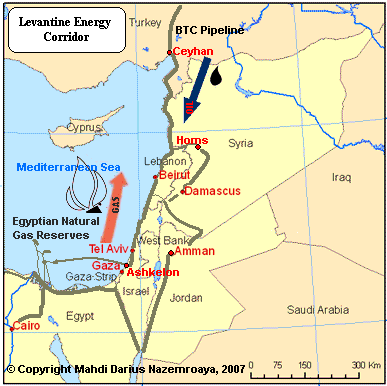
Map 3












































